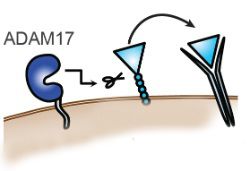News
Danish team makes enzyme discovery with cancer-fighting potential
This article is more than 10 years old.
Team from the University of Copenhagen map ADAM17 enzyme

The ability to control the ADAM17 enzyme could have huge implications (photo: KU, Faculty of Health and Medical Sciences)
Researchers from the University of Copenhagen have made a discovery that could have important implications for the treatment of cancer.
The scientists have found out what regulates the enzyme ADAM17, which aids the growth of cancer tumours.
Molecular scissors
Sarah Dombernowsky, a member of the research group led by Marie Kveiborg, an associate professor at the biomedical department of Copenhagen Biocenter, explained the role of ADAM17 in the growth of malignant tumours.
“It functions as a molecular pair of scissors, separating molecules from the cell’s surface, which then increases cell growth,” she said.
“The problem is that in cancer cells this growth is over-activated, and so the cancer tumour grows rapidly and uncontrollably.”
Research into the role of ADAM17 in the development of cancer is not new, and other researchers have previously tried to impede its processes, for example with the use of drugs. But such treatments have also interfered with other processes, resulting in severe side-effects.
Avoid side effects
The new discovery is important because it identifies the role of a protein called PACS-2 that, in principle, could be targeted so that ADAM17 alone is obstructed.
“We have discovered that the protein PACS-2 plays a big part in the transportation of ADAM17 in cells,” Dombernowsky said.
“There have been attempts at developing a pill to inhibit ADAM17, but the patients became ill due to side-effects, because other, similar enzymes were also affected. But if you inhibit PACS-2, you can, in principle, obstruct only ADAM17, which would enable us to inhibit the growth of the cancer tumour.”
The team is now conducting experiments on mice. The findings could eventually lead to the development of a new cancer treatment.
The results were published in the journal Nature Communications.










































